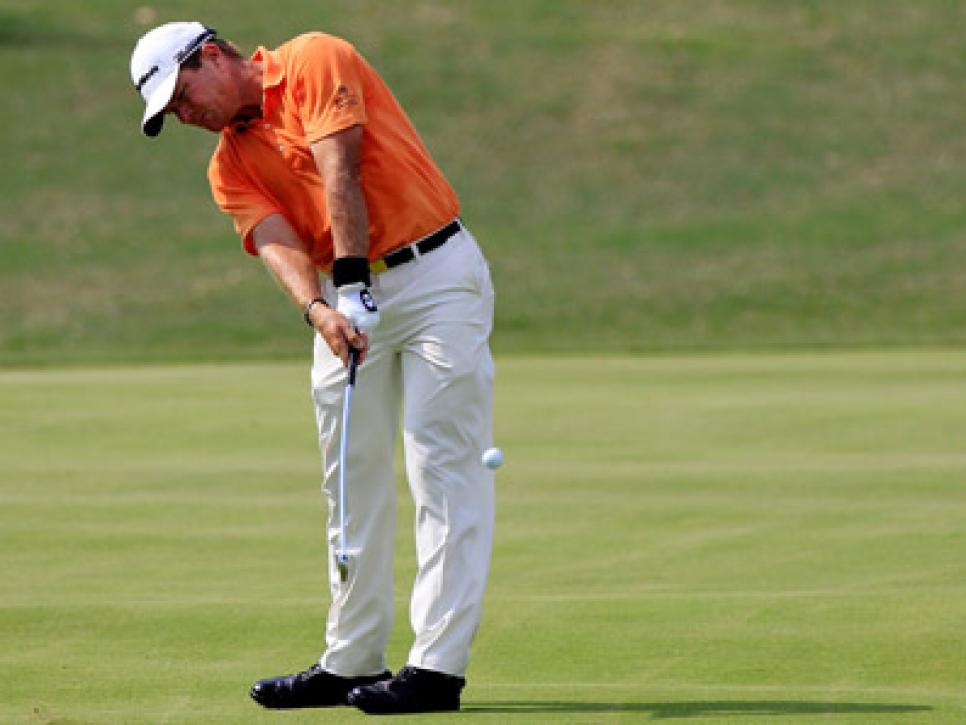The Loop
Verplank's rich career might still get its crowning moment
JOHNS CREEK, Ga. -- Looking at the sweaty 47-year-old behind a podium Saturday evening at Atlanta Athletic Club, a man who was pleased but weary, my thoughts retreated to a cold fall day a quarter century ago in Stillwater, Okla.

*Verplank was pegged to win several majors when he first started out. At 47, he's got a chance at his first. Photo by Getty Images
** *
Scott Verplank was a senior at Oklahoma State, out playing an afternoon round with his Cowboy teammates. The worse the weather, the better time to practice, as far as former OSU men's golf coach Mike Holder was concerned.
Tough weather didn't much phase Verplank, because he was tough, too. Having dealt with Type I Diabetes since he was a boy, flighting a 2-iron under the wind on a 45-degree November day was just something you did, part of the mindset and talent that made him the best amateur in the world.
A U.S. Amateur championship in 1984, individual NCAA title in 1986 and a victory in the 1985 Western Open -- the first win by an amateur on the PGA Tour in three decades -- were just a portion of his formidable record. He did it with accuracy with his long clubs, a trusty putter with a grip that he taped like it had been in an accident and a confidently gritty attitude reminiscent of so many of the greats.
On a sweltering Saturday in the Georgia heat, Verplank put himself in great position to win his first professional major championship all these years after it was expected that he might win many of them. He shot a third-round 69 -- playing the brutal last four holes of Atlanta AC in two under par -- to finish 54 holes at five-under 205, in fourth place, two strokes behind leaders Brendan Steele and Jason Dufner.
"Oh, man, can I cuss?" Verplank said when asked by ESPN's Tom Rinaldi to come up with a name for the concluding gauntlet of holes. Often pegged as a dry fellow by some who didn't really know him, Verplank has always had a nice sense of humor.
He has needed it throughout his career, that hasn't quite equalled what the potential cried out for. But those putting on the labels didn't really know how it felt when your blood sugar was going crazy with a tournament on the line. Better medical treatment has made it easier to manage his disease, with an insulin pump instead of regular injections, but it still is no picnic. He has inspired plenty of kids who are dealing with the same disease. Eight years ago, at the tour stop in Westchester, I watched him boost the spirits of the son of a friend of mine, taking plenty of time to give him some encouragement and tell him how a full life was still possible despite having diabetes.
Despite the complications of diabetes, a severe elbow injury that led to two surgeries and a nasty case of the driving yips in the 1990s, Verplank has won five PGA Tour events, the last an emotional triumph at the 2007 EDS Byron Nelson Championship in the suburbs of Dallas, his hometown, a year after the gentlemanly tournament host had passed away.
Instead of winning multiple majors as many thought he would, Verplank's best has been six top-10 finishes. One of those came 10 years ago in the 2001 PGA at Atlanta Athletic Club, where Verplank closed with a 67, finished T-7 and got a call that night from United States Ryder Cup captain Curtis Strange, the first American skipper to use a pick on someone with no Ryder Cup experience.
"I knew that Sunday was a huge round," Verplank recalled, "that if I played good, my chances went up, and I had never been on a Ryder Cup team and they had never picked a rookie. So I went out and played very well on that Sunday. Even though they have changed the golf course a lot, I've had pretty good feelings around here."
This season has been difficult for Verplank, who has suffered from a left wrist problem since last year. It has limited his play and caused him worry about his future as a competitor. He was T-2 in Houston, T-9 at The Heritage but wasn't in the field at the three previous majors in 2011. Verplank got into the PGA as result of his position on the World Ranking (he's currently No. 87).
"I don't feel a day older than a hundred," he said when asked how it felt to be in such good position with a round to play. "My year is just starting. My wrist has been bothering me for over a year, and I didn't even know I was going to be in the PGA until two weeks ago."
Verplank has made the best of his appearance on a course that demands a lot, utilizing the stay-in-the-game attitude he has always had to have a good shot at becoming the second-oldest winner of a major behind Julius Boros, who won the 1968 PGA when he was 48. "You know what, I hope that I can turn back the clock a little bit, and go back to when I was about 21 when I won everything," Verplank said. "Maybe that will happen overnight."
He was tired and hungry but smiling when he said it. Verplank wasn't going to go putt, he was going to go eat.
You never know. Twenty-five years ago, a couple of months after Verplank turned pro, his good friend, Bob Tway, won the 1986 PGA Championship.
Sunday afternoon, Scott Tway, Bob's brother and Verplank's longtime caddie, will be by Verplank's side. For a guy who has gotten his share of bad breaks, it might be some coincidental good karma.
-- *Bill Fields *

